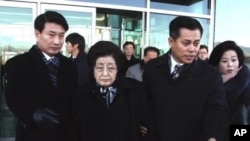Two small South Korean civilian delegations have crossed the border on their way to Pyongyang to pay condolences after the death of long-time leader Kim Jong Il. With the state funeral just days away, North Korean state television has been in overdrive to promote Kim Jong Il's younger son and successor, Kim Jong Un, as a great military leader - despite his lack of experience.
Thetwo small delegations crossing the heavily armed border were accompanying widows of central figures from South Korea's "Sunshine Policy" era of generosity toward North Korea.
Lee Hee-ho is the widow of former president Kim Dae-jung, whose historic 2000 summit with Kim Jong Il cleared the way for economic cooperation between the two Koreas and the transfer of billions of dollars in aid to the impoverished North.
Yoon Chul-gu, Secretary-General of the Kim Dae-jung Peace Foundation, read a statement from Lee, saying her visit was to reciprocate an earlier courtesy on the part of the North.
"When my husband passed away in August 2009, chairman Kim Jong Il sent a condolence delegation to Seoul. I think it is a duty to make a condolence call," she said in the statement.
Hyun Jeong-eun, the widow of Hyundai group former chairman Chung Mong-hun, crossed in a separate small delegation. The Hyundai conglomerate was instrumental in building and managing special economic zones for tourism and industry in North Korea, and has made extensive investments to stimulate North-South economic cooperation.
"The South is allowing the civilian groups' visit North Korea for the future of the North-South relations," said Choi Boh-seon, a spokesman for South Korea's Unification Ministry. "Seoul hopes this would create momentum to continue reconciliation and exchanges between the two Koreas."
South Korea tightly controls travel to the North under its National Security Law. The two delegations are the only civilians permitted to pay condolences. No South Korean government delegation is visiting the North.
A semi-official North Korean website had offered to allow in any South Korean group willing to pay condolences to the late Kim. But Brian Myers, a professor specializing in North Korean propaganda at South Korea's Dongseo University, says Pyongyang was never likely to insist on a mass visit.
"They don't really want a sizeable South Korean delegation, not just because it would cause logistic problems, but also because they would be unlikely to behave in the way expected of them," he said. "I think the North Koreans would expect any Korean visitors to Pyongyang to be just as distraught, or at least to put on an act and pretend to be as distraught, as the locals. And I don't think the South Koreans would be likely to do that."
It remains unclear whether the two delegations will have an opportunity to interact personally with Kim Jong Il's youngest son and successor, Kim Jung Un. North Korean media have been portraying the young Kim as upholding his father's "military first policy," reporting that he has been named "supreme commander" of the country's forces.
Professor Myers says information about the new leader himself has been scant.
"There's a lot more talk about people's admiration for the young man than there is actual talk about the young man himself," he said. "We're getting repeated avowals of unity and loyalty to the young man, and we're still not seeing an official biography of him. So I think average North Korean is asking himself just what makes this person so uniquely qualified to rule."
Kim Jong Il's funeral is scheduled for Wednesday.
South Korean Civilian Delegations Head North for Kim Funeral




